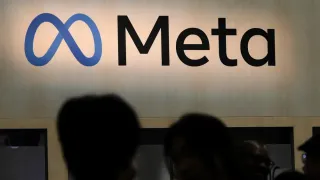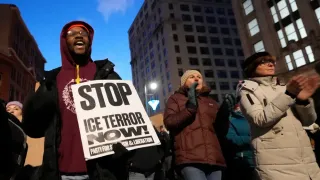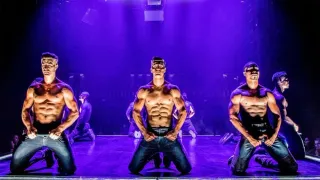August 5, 2020
Editorial: Raise An Inclusive Castro Flag
BAR Editorial Board READ TIME: 4 MIN.
The Castro Merchants, the organization of neighborhood businesses that oversees the iconic rainbow flag flying at Castro and Market streets, should consider installing a more inclusive version of the global symbol of LGBTQ rights. Given the recent attention on racism and other issues at bars in the area, it's timely for an updated, inclusive flag that would send a strong symbolic message of the values that the community strives to uphold. Over the years, we've reported on disagreements over whether to lower the flag to half-staff to honor deaths or debates over various proposals to raise other flags like the transgender flag on Transgender Day of Remembrance, the leather pride flag for the Folsom Street Fair, or the American flag on Veterans Day. Two new flag designs that are variations of the rainbow flag have been growing in popularity and use: the Philadelphia People of Color Inclusive flag, which adds black and brown stripes representing queer people of color, and the Progress Pride flag, which goes further by adding black and brown and the transgender flag colors in sideways chevrons on the left.
The late Gilbert Baker, who co-created the first rainbow flags with his friends Lynn Segerblom and the late James McNamara in 1978, campaigned for 10 years to get the Castro flagpole erected. He believed that the flag should not be lowered and considered it art. Baker died in 2017, but we'd like to think that he'd support a flag design that expands inclusivity.
Racism in the Castro is not new. Even before the Badlands discrimination case in 2004, our archive reveals reporting on mistreatment of people of color at what were then known as gay bars by requiring multiple IDs, enforcing dress codes, or simply refusing entry. In the Badlands case, which resulted in sustained weekly protests for months, an investigation by the San Francisco Human Rights Commission found that the nightclub was discriminating against African Americans. The findings were never official, however, because the HRC executive director at the time did not sign off on the staff report. Owner Les Natali and the complainants eventually reached a confidential settlement. Natali has consistently denied the accusations and last week said the bar – shuttered now because of the novel coronavirus pandemic – would permanently close and a new establishment, under new ownership, would open in its place later this year – that, of course, depends on when public health orders will allow bars to reopen.
On July 30, the newly formed Bay Area Queer Nightlife Coalition held a four-hour public meeting that included owners or representatives from five LGBTQ bars, three of which are in the Castro. Hundreds of people watched the online forum on Twitch. Most Castro bars in a survey conducted by the coalition scored poorly on the inclusivity ranking and only slightly better on safety. During the meeting, owners of The Edge acknowledged that the session had been "eye-opening" and said they would devise an actionable plan to address concerns. A former bartender said he was called the N-word on more than one occasion, and so did someone who patronized the bar. Representatives from Badlands and Toad Hall, two establishments that Natali owns, said that Natali had signed a pledge of inclusivity. (He was not on the meeting, but the other employees said they want to move forward. Badlands scored last in the coalition's survey in both categories.)
The flag at Market and Castro streets is prominently displayed and greets visitors arriving in the neighborhood. Merchants and residents have always attempted to project a more welcoming image and atmosphere, which is more urgent now in order to reverse the economic damage done to bars and restaurants due to the shutdown and restriction on indoor service because of COVID-19. An inclusive flag should be a centerpiece of several enhancements to the neighborhood.
Oakland Pride this week updated its logo to include the black and brown, and the pink, blue, and white colors of the trans flag. Officials said that it is the first major Pride organization to do so. Over Pride Month in June, some cities in suburban Contra Costa County opted to fly the Philly flag, as did the East Bay Municipal Utility District headquarters in Oakland. Sacramento flew the Progress flag.
As we recently reported, petitions were started in June to change the flag that flies over Harvey Milk Plaza. To date, there has not been a formal response from the Castro Merchants business group. We report regularly on rainbow flag thefts, government agencies that won't let them be raised, and other related news: It's clear that the flag means a lot to people, and it should. An inclusive flag extends pride to more people; it says, "You matter."
It will take a commitment to diversity from business leaders to make this happen, and a serious effort would set a deadline – the Castro Street Fair, which is scheduled for October 4, seems appropriate even though it's likely it will be a virtual affair. Raising a new flag design could be an opportunity to launch a comprehensive campaign that includes pledges from all businesses in the district that they are welcoming to everyone – LGBTQ and straight alike; Black, Brown and Indigenous people; Asians, Native Americans, and those with disabilities; young and old – without the epithets, misgendering, and other terrible things that people have experienced over the years.
Symbolism is important (otherwise Confederate statues would not be toppling across the country). It's time that the flag in the Castro changes to reflect all of us.
Editor's note: If you liked this article, help out our freelancers and staff, and keep the B.A.R. going in these tough times. For info, visit our Indiegogo campaign. To donate, simply claim a perk!






